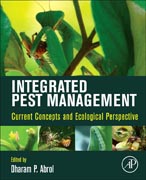
Integrated Pest Management: Current Concepts and Ecological Perspective
Abrol, Dharam P
Integrated Pest Management: Current Concepts and Ecological Perspective presents an overview of alternative measures to traditional pest management practices using biological control and biotechnology. The removal of some highly effective broad-spectrum chemicals, caused by concerns over environmental health and public safety, has resulted in the development of alternative, reduced risk crop protection products. These products, less toxic to the environment and easily integrated into biological control systems, target specific life stages or pest species. Predation - recognized as a suitable, long-term strategy - effectively suppresses pests in biotechnological control systems. Integrated Pest Management covers these topics and more. It explores the current ecological approaches in alternative solutions, such as biological control agents, parasites and predators, pathogenic microorganisms, pheromones and natural products as well as ecological approaches for managing invasive pests, rats, suppression of weeds, safety of pollinators, role of taxonomy and remote sensing in IPM and future projections of IPM. This book is a useful resource to entomologists, agronomists, horticulturists, and environmental scientists. Fills a gap in the literature by providing critical analysis of different management strategies that have a bearing on agriculture, sustainability and environmental protection Synthesizes research and practice on integrated pest managementEmphasizes an overview of management strategies, with critical evaluation of each in the larger context of ecologically based pest management INDICE: SECTION 1: ECOLOGY OF PEST MANAGEMENT 1. Ecology of Pest Management 2. Host plant resistance in pest management 3. Impact of climate change on pests and pest management: Implications for crop production and food security 4. Application of remote sensing in integrated pest management 5. Weather-based pest forecasting for efficient crop protection 6. Forecasting of Colorado potato beetle development by means of computer aided system SIMLEP Decision Support System SECTION 2: CHEMICAL CONTROL OF CROP PESTS 7. Role of semiochemicals in integrated pest management 8. Pesticides appled for the control of invasive species in the United States 9. Potential and utilization of natural products in pest control SECTION 3: BIOLOGICAL CONTROL OF CROP PESTS 10. Biological control of insect pests in crops 11. Use of pheromones in insect pest management 12. Role of entomopathogenic fungi in IPM 13. Entomopathogenic nematodes for insect pest control 14. Entomopathogenic viruses and bacteria for insect pest control 15. Biological Control of Weeds by Plant Pathogens Using the Bioherbicide Approach 16. Biological control of invasive insect pests 17. Use of spiders as natural enemies to control insect pests 18. Cultural practices and physical methods for the management of insect pests SECTION 4: BIOTECHNOLOGICAL APPROACH TO MANAGEMENT OF CROP PESTS 19. Biotechnological approaches for insect pest management 20. Biotechnological approaches for non-insect pest management 21. Genetically modified crops in IPM: agricultural, ecological, and evolutionary implications 22. Breeding of crops for resistance against insect pests and diseases SECTION 5: MISCELLANEOUS ISSUES RELATED TO CROP PEST MANAGEMENT 23. Integrated management of rodent pests 24. Ecofriendly management of phytophagous mites 25. Risk to biodiversity by exotic species introduced for biological control 26. The critical role of taxonomy in IPM-Challenges and opportunities 27. IPM Extension: A Global Overview 28. Future of integrated pest management in the 21st century, whither or wither-A critical analysis
- ISBN: 978-0-12-398529-3
- Editorial: Academic Press
- Encuadernacion: Cartoné
- Páginas: 576
- Fecha Publicación: 13/11/2013
- Nº Volúmenes: 1
- Idioma: Inglés
